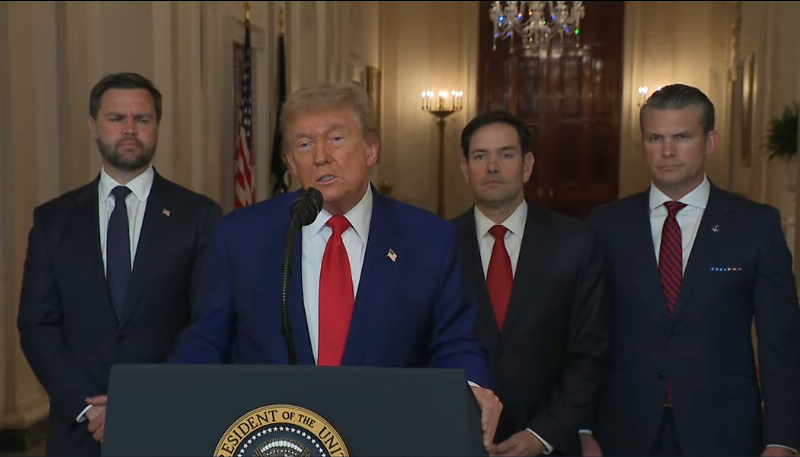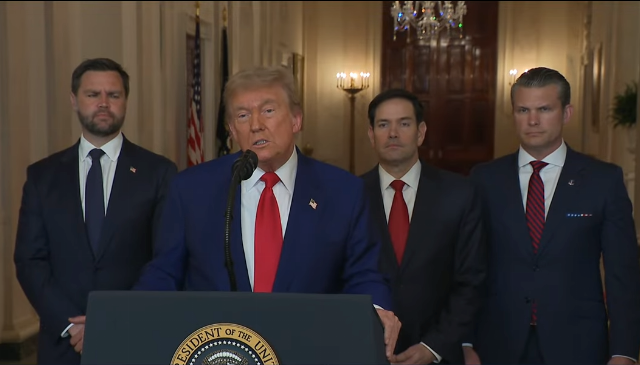


In the hours since President Trump notified the world that the American military had completely obliterated Iran’s three primary nuclear-bomb-making facilities, including the dreaded under-the-mountain fortress of Fordow, two major themes have emerged: (1) From Democrats, the claim that Trump acted unconstitutionally by violating the War Powers Act, and (2) from many conservatives, concerns about the possibility of a long war. I know that the Democrats are wrong, and I think that the conservatives are wrong, too (which is the Democrats’ fault).
First, the War Powers Act issue. Predictably, within minutes, Democrats started shrieking that Trump had violated it and that he’d violated the Constitution. AOC led with a demand that he be impeached. I know that a lot of Democrats were saying it, so here are representative tweets from three of the highest-profile Dems:
Tonight, the President ignored the Constitution by unilaterally engaging our military without Congressional authorization.
— Nancy Pelosi (@SpeakerPelosi) June 22, 2025
I join my colleagues in demanding answers from the Administration on this operation which endangers American lives and risks further escalation and…
The President’s disastrous decision to bomb Iran without authorization is a grave violation of the Constitution and Congressional War Powers.
— Alexandria Ocasio-Cortez (@AOC) June 22, 2025
He has impulsively risked launching a war that may ensnare us for generations.
It is absolutely and clearly grounds for impeachment.
My statement on Donald Trump’s unilateral military action in Iran. pic.twitter.com/2ZjZXlPbrl
— Hakeem Jeffries (@RepJeffries) June 22, 2025
They’re all wrong, of course.
First, regarding the constitutional issue, the Constitution gives the president several powers, indicating that he has complete control to make overseas military strikes to protect American interests.
In Art. II, Sec.1, the Constitution gives him “executive power” generally, which has always been understood to mean the power to guide America’s foreign policy. Article II, Sec. 2 makes him Commander in Chief of the military, and gives him the implied power to deal with foreign nations, limited only by the explicit requirement that the Senate provide advice and consent for actual treaties. Lastly, Art II, Sec. 3 gives him the sole authority to deal with ambassadors and other public ministers.
All those powers, especially the Commander-in-Chief one, cease to have meaning if Congress gets to oversee his every military decision. Just imagine if, before every military action, the president had to consult with and get a buy-in from all 541 members of Congress. It would take months to agree on anything (assuming agreement could be reached), and operational secrecy would be impossible.
(Speaking of operational secrecy, the White House and Pentagon maintained perfect operational secrecy, something they allegedly achieved by refusing to brief congressional Democrats.)
Second, given the broad foreign and military powers the Constitution grants the presidency, it’s doubtful if the War Powers Resolution (aka the War Powers Act), a relic of the Vietnam War, is even constitutional. Congress passed the Act to limit the President’s power to take American troops to a foreign war without Congress’s approval, something that would seem to limit severely the president’s express and implied constitutional powers. Still, no president has challenged it, so we’ll accept that it applies.
Under the Act’s terms, the president must notify Congress within 48 hours after deploying troops. Trump notified Congress while troops were still in the air. In other words, he complied with the law. End of story. No impeachment there.
So, as always, Democrats are wrong.
But what about the concern many conservatives are expressing that Trump has embroiled us in another long, bloody war? After all, our last four wars have often been endlessly long and all ended badly.
While America’s involvement in the hot phase of the Korean War lasted only three years, it led to 36,574 American deaths. It ended with a stalemate that has seen North Korea become the world’s most repressive country
America was actively involved in the Vietnam War for a decade, with 58,220 American deaths, and ended with a complete loss to the communist Viet Cong.
The Iraq War lasted for seven years, with 4,419 American deaths. It ended with a total troop pullout that saw the country get sucked into Iran’s orbit.
Finally, the War in Afghanistan lasted for 20 years with 2,448 American deaths. It ended with a Taliban win that included acquiring billions of dollars of American military equipment.
In all those wars, American blood was spilled and treasure lost for nothing.
But here’s the thing: Every one of those poorly waged wars and every one of those disastrous endings was entirely or mostly the Democrats’ fault.
Korea happened on Truman’s watch.
The Vietnam War, while badly bungled, saw the left snatch defeat from the jaws of victory. That happened domestically psychologically when communists successfully created the antiwar movement, and when Walter Cronkite, after America won the Tet Offensive, announced it was a loss.
It also happened as a matter of official Democrat policy. Nixon managed to extricate America from the war while leaving South Vietnam free of communism and under the protection of the American umbrella. However, in 1975, the Democrat-controlled Congress pulled all funding from South Vietnam, which promptly led to Vietnam’s total fall to the communists.
In 2011, Iraq was stable and America-oriented. Barack Obama promptly pulled all American troops out, creating the vacuum into which ISIS stepped. It’s noteworthy that, not long after Trump entered office, he had attacked ISIS, which had seemed unstoppable under Obama’s (ahem) “leadership,” and managed in a matter of months to erase it so thoroughly that few other than its surviving victims remember it today.
And of course, who can forget Joe Biden’s utterly ignominious withdrawal from Afghanistan, a massive surrender that created the last 13 American casualties in that long war?
No wonder conservatives are worried. However, the example of ISIS should assuage that concern. Trump has no interest in a long war and has no compunction or embarrassment about using massive military force to destroy an enemy. He’s not interested in a perfectly balanced, “proportional” war in which, according to the old Marquess of Queensberry Rules, no side has an “unfair” advantage. Trump fights to win, and he knows that the worst wars are the long wars.
Trump also has no interest in nation-building. Unlike multiple American presidents from Wilson to George W. Bush, Trump believes the point of America going to war is to protect America, not to “make the world safe for democracy.” He will do whatever is necessary to keep American democracy safe, and that’s it. Regime change will be good for Iran, but that’s not Trump’s problem.
If this is a bigger fight than destroying three nuclear sites, so be it. But Trump will be in it to win fast. Indeed, he’ll probably try to get the whole thing done in eight weeks, to avoid the second part of the War Powers Resolution. That’s the part that says that he must withdraw troops within 60 to 90 days, unless he gets Congress’s permission to act otherwise.
(See also Steve Stockman’s essay explaining why concerns about a long war are wrong.)
Trump did what needed to be done to prevent an apocalyptic nation with America in its crosshairs from achieving full nuclear weaponization. He did so within constitutional and legislative parameters, and I’m betting that he’ll move so powerfully and expeditiously that the last thing we need to worry about is a long war.

Image: White House screen grab (cropped).
